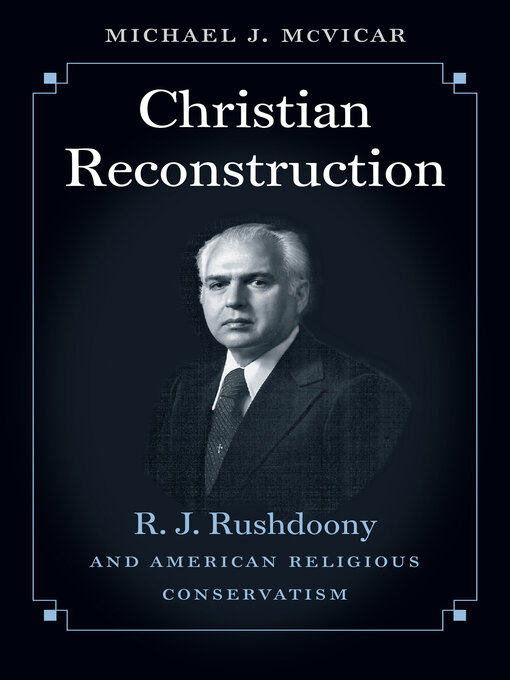- Fiction
- Nonfiction
- Biographies and Autobiographies
- Religion and Spirituality
- Politics
- Battle of the Books 2023
- RCCC Library Picks
- See all dogwood digital library's collections collections
Christian Reconstruction
R. J. Rushdoony and American Religious Conservatism
McVicar examines Rushdoony's career and traces Reconstructionism as it grew from a grassroots, populist movement in the 1960s to its height of popularity in the 1970s and 1980s. He reveals the movement's galvanizing role in the development of political conspiracy theories and survivalism, libertarianism and antistatism, and educational reform and homeschooling. The book demonstrates how these issues have retained and in many cases gained potency for conservative Christians to the present day, despite the decline of the movement itself beginning in the 1990s. McVicar contends that Christian Reconstruction has contributed significantly to how certain forms of religiosity have become central, and now familiar, aspects of an often controversial conservative revolution in America.
-
Creators
-
Publisher
-
Release date
April 27, 2015 -
Formats
-
OverDrive Read
- ISBN: 9781469622767
- File size: 2366 KB
-
EPUB ebook
- ISBN: 9781469622767
- File size: 3059 KB
-
-
Languages
- English
-
Reviews
-
Publisher's Weekly
Starred review from January 19, 2015
How is it that a man the author describes as “one of the most controversial ministers of the 20th century” is also a man whom most people have never heard of? Such is the story of R.J. Rushdoony and his campaign to introduce “Dominion Theology,” which champions a national government run by Christians that would “reconstruct” American society. Rushdoony set out to transform both Protestant Christianity and the American system, issuing a clarion call for Christians to engage, and ultimately control, American government and public education. Along the way, he enlisted the help of a large cadre of fellow thinkers, some of whom had different goals. Rushdoony’s ideas prevailed; his written works could fill a bookshelf. But infighting sank the movement: “the Reconstructionists could not agree with one another regarding the nature and meaning of Christian dominion,” McVicar writes. And thus the Reconstructionist idea has receded in the American consciousness, but not until it helped shape the politics of the American Religious Right. McVicar, assistant professor of religion at Florida State University, has produced a landmark work describing the rise and eventual fall of Reconstructionist thought. This fine work is highly recommended. -
Library Journal
March 15, 2015
McVicar (religion, Florida State Univ.) provides an extensively researched and critical yet balanced history of the Christian Reconstruction movement and its founder, R.J. Rushdoony (1916-2001). The author relies on a multitude of resources, including Rushdoony's personal papers and correspondence, to demonstrate that the movement and its creator aspired to a powerful "restructuring" of individual lives and also of American society and politics as a whole through their variety of controversial "Christian" leadership, based in part upon Old Testament law. McVicar doesn't shy away from discussing some of the moral contradictions--mean-spiritedness and even cruelty, personal opportunism disguised as piety--of Rushdoony and his associates. Despite the movement's decline starting in the 1990s and beyond, McVicar finds many of its racist, patriarchal, antistate, and educational tenets (such as homeschooling) flourishing in newer movements (e.g., the Tea Party) and in much popular public opinion--especially about what constitutes good and bad religion. VERDICT Specialists in religion, politics, sociology, history, and cultural analysis, as well as the general public, can find rich reflection herein no matter their personal, political, or religious persuasions.--Carolyn Craft, emerita, Longwood Univ., Farmville, VA
Copyright 2015 Library Journal, LLC Used with permission.
-
Formats
- OverDrive Read
- EPUB ebook
Languages
- English
Loading
Why is availability limited?
×Availability can change throughout the month based on the library's budget. You can still place a hold on the title, and your hold will be automatically filled as soon as the title is available again.
The Kindle Book format for this title is not supported on:
×Read-along ebook
×The OverDrive Read format of this ebook has professional narration that plays while you read in your browser. Learn more here.


